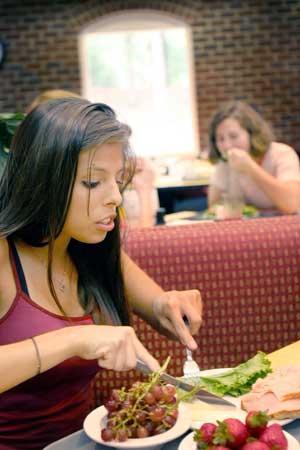
Students are always on the go. Classes, intramural sports, part-time jobs, Greek Life and other campus organizations are all part of their daily to-do lists.
Those living on campus spend all day rushing from one obligation to the other, and when dinner time comes, many can’t make it to the dining hall before closing.
Members of Student Government are trying to change that by pushing for extended hours in the dining halls.
Student Body President Will Quick said the issue was originally brought to his attention during his campaign last year, and after that it became part of his platform.
According to Quick, it doesn’t makes sense for the dining halls to close early when many things taking place on campus — such as classes, intramural sports, movies shown in the Campus Cinema and plays at Thompson Theatre — end late.
“There’s just not time to squeeze your meal plan in,” Quick said.
Sarah Rogers, a freshman in First Year College, is taking a precalculus class that doesn’t get out until 8:30 p.m. She said she has the unlimited meal plan, and would use the dining hall if it were open later.
“Now I have to make sure I eat before I go to class,” Rogers said. “It’s terrible.”
Steve Edwards, the director of board operations for University Dining, said he has been working with Quick to get a pilot planned for sometime during the spring semester. He said Quick was the first to come to him with the issue, although it is something University Dining has studied in the past.
“We used to actually run late night dining service in Fountain Dining Hall, when there was only one dining hall,” Edwards said.
However, he said interest dwindled after a while, and keeping late hours wasn’t efficient.
According to Edwards, there are many ways the issue could be addressed, and University Dining said it wants to be sure it finds the best, most cost-effective way.
“If there is desire and support by our customers to do it, then we want to do it,” Edwards said.
Quick originally proposed a “fast track” dining option for late-night eating. The menu would consist of things like hot dogs, hamburgers and cold cuts. However, Edwards suggested using a broader menu.
“Burgers and hot dogs are going to get old after a while,” he said. “The costs are going to grow.”
He also pointed out that the Wolves’ Den, which is open until 10 p.m. Monday through Friday, already meets the late-night need for students.
“If the menu at the Wolves’ Den isn’t meeting that need now, why would the exact same menu do so elsewhere?” Edwards said.
According to Edwards, not all students will eat hot dogs and hamburgers anyway, because of dietary regulations. He said students with religious restrictions, like Muslims or Jews, or personal conviction, such as vegetarians or vegans, should be considered too.
Edwards said staffing is another issue to be considered. Many University Dining employees ride public transportation. The last bus to Moore Station from campus leaves at 9:45 p.m.
He said one option University Dining is looking at is extending the regular meal for an extra hour, and switching to paper plates toward the end of the night to make cleanup quicker for employees. That way, he said, they could still catch the bus.
Austin Samples, a senior in computer and electrical engineering, said he wouldn’t mind if it was only extended by one more hour.
“I would appreciate it,” he said. “I’ve noticed that if you get out there at 7:30 p.m. … they don’t really have anything left. They’re cleaning up.”
Lauren Stark, a freshman in architecture, said she would love an extension in dining hours. Between her classes, club volleyball and her sorority obligations with Delta Zeta, she said she never has time to eat.
“I’m doing every possible thing. It never ends until 10 p.m.,” she said.
However, according to Stark, she wouldn’t be willing to walk too far to eat later, because “walking is time.”
Quick said this is something he and Edwards discussed, and he said if campus showed enough support for the project, hours could maybe eventually be extended in all dining halls.
University Dining is weighing the options, according to Edwards, and the pilot program in the spring will indicate how much campus supports an extension of dining hours. It will also help smooth out demand versus cost concerns, he said.
According to Edwards, if the campus is in favor of the extension, “we have no reason not to.”